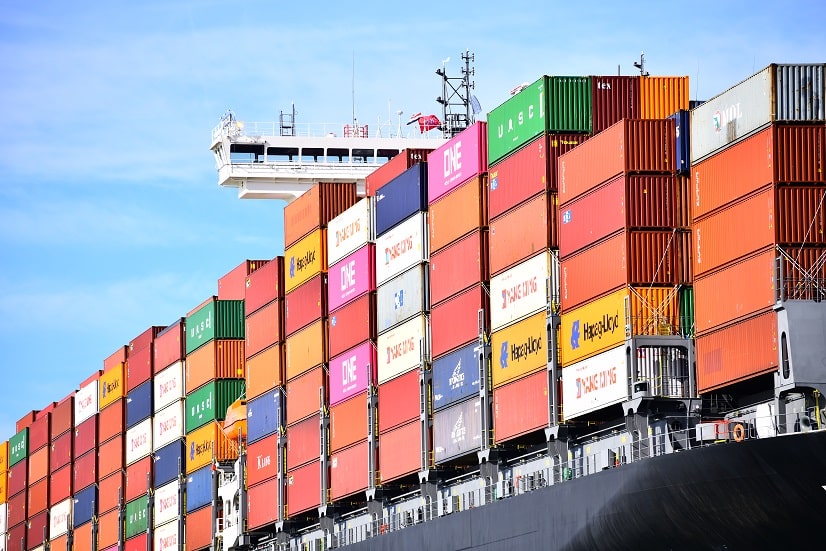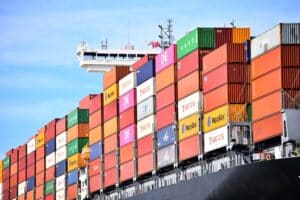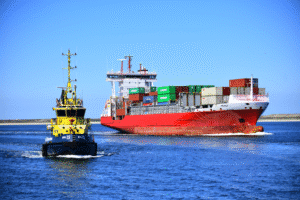The implementation of the Secure Chain is a subproject within the comprehensive ‘Uitvoeringsagenda Haven’ (Port Implementation Programme). Project director Rien van der Steenoven explains the details of this joint public-private programme to combat undermining and underlines why the secure and reliable release of import containers constitutes such an important component in this. “Eliminating the PIN code from the logistics process has had a tremendously positive impact.”
“The port of Rotterdam is extremely effective and efficient. Goods enter Europe quickly and cost-effectively. Unfortunately, criminals take advantage of this,” describes Van der Steenoven the situation. “They are abusing the efficient organisation of the Dutch ports.” A study conducted by Erasmus University Rotterdam in 2019 showed that the scale and nature of undermining (drug) criminality was high in the port of Rotterdam. To gain more control over this, public and private parties launched the Port Implementation Programme in 2020. The programme now receives structural funding from the Ministry of Justice and Security. Participants are the municipality of Rotterdam, the Seaport Police, the Public Prosecution Service, the Tax and Customs Administration, the Fiscal Information and Investigation Service (FIOD), Customs, the Regional Information and Expertise Centre, the Port of Rotterdam Authority and Deltalinqs.
Three-pronged approach
Van der Steenoven: “In the Implementation Programme, we use a three-pronged approach. Firstly, we cooperate internationally, both with European countries and with the source countries of the drugs. The second prong focuses on creating barriers against the drug economy here in the port and the city. The third prong focuses on tackling drug criminals and seizing their assets.” The three prongs form the basis for a comprehensive range of measures. Under the umbrella of the Implementation Programme, the participating parties carry out 22 different projects, with numerous subprojects as well. “Each participant is responsible for part of the programme and bears co-responsibility for the entire project.”
Digital leak patched
Among other things, the study by Erasmus University Rotterdam showed that it was far too easy for criminals to find information about specific containers. “It was very easy to use a PIN code to collect a container at a terminal under false pretences,” says Van der Steenoven. The introduction of the Secure Chain – for which the Port of Rotterdam Authority is formally the client under the Implementation Programme – has patched this digital leak in the release of containers. “Parties have successfully eliminated PIN codes from the logistics process. In the past, fraud involving PIN codes would result in large quantities of drugs passing through the port, but this has now virtually stopped. Eliminating the PIN code has had a tremendously positive impact.”
The programme Project director emphasises that he is pleased with the Secure Chain, in which the authorisation to collect a container is digitally passed on from one link to the next via the services of Portbase. “The starting point is that only those parties that need information for collecting a container have access to it.” “Based on the Implementation Programme, our primary focal point was on high-risk containers from Latin America,” continues Van der Steenoven. “But it is only logical that parties in the logistics chain want to process all incoming containers in a uniform manner. Furthermore, the new approach also benefits the overall functioning of the logistics system.” Closing off this logistics system to unauthorised parties involves striking a delicate balance. “It is possible to close it completely, but then no more containers will get through. The port must remain efficient. The Secure Chain makes this possible.”
Win-win situation
The Implementation Programme and the Secure Chain which forms part of it are perfect examples of public-private partnerships. Van der Steenoven would like companies to be even more aware of the importance of such partnerships. “Participating and co-investing in security ultimately leads to a better company, with fewer disruptions to the operational process; simply put, it saves money.” In the Secure Chain, public-private cooperation has made a real difference. “A win-win situation. The logistics chain is more secure and containers are able to efficiently pass through it.”
Implementation Programme continues
Van der Steenoven is not naive. “We do not think that the criminals have stopped. The question is what their next method of operation will be. Answering that is almost like predicting lottery numbers.” The nine parties that together form the Implementation Programme will therefore continue. “We will not be satisfied until the people that operate in the layers below management within organisations also understand the significance of participation for both society in general and for their own company. Together, we can achieve more and make a difference.”



